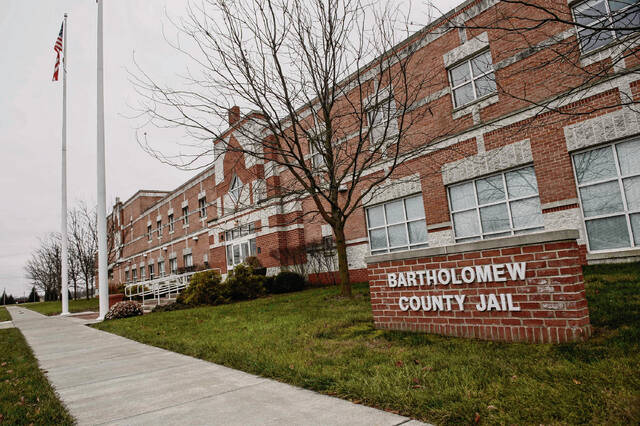
Mike Wolanin | The Republic The exterior of the Bartholomew County Jail in Columbus, Ind., pictured Friday, Dec. 15, 2017.
The Bartholomew County Jail is providing computer tablets to inmates, but the effort is not being funded by taxpayer money.
Known as ComPAS (Portable Access System) tablets, the computers will be distributed by Homewav, LLC without any cost to local taxpayers. The vendor makes its money through the sale of programs and services to inmates, including those available through the ComPAS tablets, jail Commander Maj. John Martoccia said.
A master service agreement between Homewav and the county regarding the tablets was approved 2-1 this week by the Bartholomew County commissioners.
Each tablet is capable of providing messaging, forms, a law library, commissary ordering, educational opportunities and entertainment – including a selection of movies, books, music, and games, according to the company’s website. In addition, the tablets can be used to find a job, the jail commander said.
“We can also put on church services, so we can keep some people from coming into the jail, especially during COVID outbreaks,” Martoccia said. “It’s really rough because you don’t know what people are going to be bringing in with them.”
But Bartholomew County commissioner Larry Kleinhenz expressed doubts on whether most inmates would use the tablets for educational, spiritual or productive purposes, and voted against the proposal.
“I think the best thing these tablets can accomplish – and I would argue the only thing – is that they will entertain the inmates,” Kleinhenz said. “Culturally, the thought of an inmate lying on his bunk in a 70-degree cell watching ‘Tommy Boy’ is just not pleasing to the eye for me, nor what is expected of a jail inmate,” Kleinhenz said.
The only one of the three commissioners to vote against acquiring the tablets, Kleinhenz said he’s also concerned that inmates will pressure relatives with limited funds to depositing sizable amounts of money into their commissary fund, so they can buy services available through the tablets.
While there are some free movies, film rentals range from $8 to $10 and the county will eventually receive a portion of the rental fees, according to the master service agreement.
The jail already has a quality program for helping inmates complete their GED, Kleinhenz said.
“There has to be a little bit of desire from the inmate to accomplish that,” the commissioner said.
But advocates say that by occupying an inmate’s time, the tablets will cut down on violent and disruptive acts, making the jail a safer environment for everyone within the facility.
Giving inmates access to a legal library is a legal requirement for Indiana jails, Martoccia said. While these computers do not allow direct access to the internet, he said they do allow inmates to text family and friends at a cost cheaper than the U.S. postal service. In addition, the tablets will reduce congestion where up to 34 inmates have to share two communications kiosks, the jail commander said.
In regard to inmates pressuring relatives to put money into their commissary fund, Martoccia said the person being pressured always has the option to say no.
Only inmates that are considered in good standing would be provided a tablet, Martoccia said. Jail administrators have control on what the devices can offer, which means they can prohibit offensive movies or music, he said.
If an inmate intentionally breaks a tablet, Homewav will replace it without cost to county taxpayers, Martoccia said. The inmate will lose the privilege of having a tablet, as well as the ability to log onto someone else’s computer, he added. The inmate will be charged for the new computer, and paperwork will be sent over to the prosecutor’s office for charges of damaging property, the jail commander said.
“It’s the same thing as if they break a TV now,” Martoccia said. “I don’t know if we usually get paid back for it, but once they go to court, they are fined a fee for the damages.”
Tablets have already being distributed to inmates in both Jennings and Scott counties, Martoccia said. Several other Indiana counties have recently agreed to receive the service, as well as the Indiana Department of Correction, he said.
Bartholomew County Sheriff Matt Myers said county officials and the community must remember that as many as half of the inmates currently in the jail are “pre-trial,” meaning they are considered innocent until proven guilty.
“Some people think we are being too nice,” Myers said, “But we are watched on how we treat inmates, and they have constitutional rights while in custody.”
He added that it is the county’s responsibility to “do everything we can to save the ones we can,” Myers said. “And shame on anybody who is against this, we are trying to do different things to see if it will work. We need people to have more empathy and not be so judgemental.”
Myers commended London and Commissioner Carl Lienhoop for having the foresight to think outside the box and offer the tablets in the hopes it will help those incarcerated in the jail.
Although two of the three county commissioners approved the tablets, the motion made by commissioner Tony London specifically stated they would be used mainly for educational purposes. It’s unclear whether that specific wording might further limit services available.
Homewav has been doing business with Bartholomew County since COVID-19 broke out in 2020, providing communication systems for inmates to visit with relatives without the visitor coming physically to the jail.
The Republic Editor Julie McClure contributed to this story.




